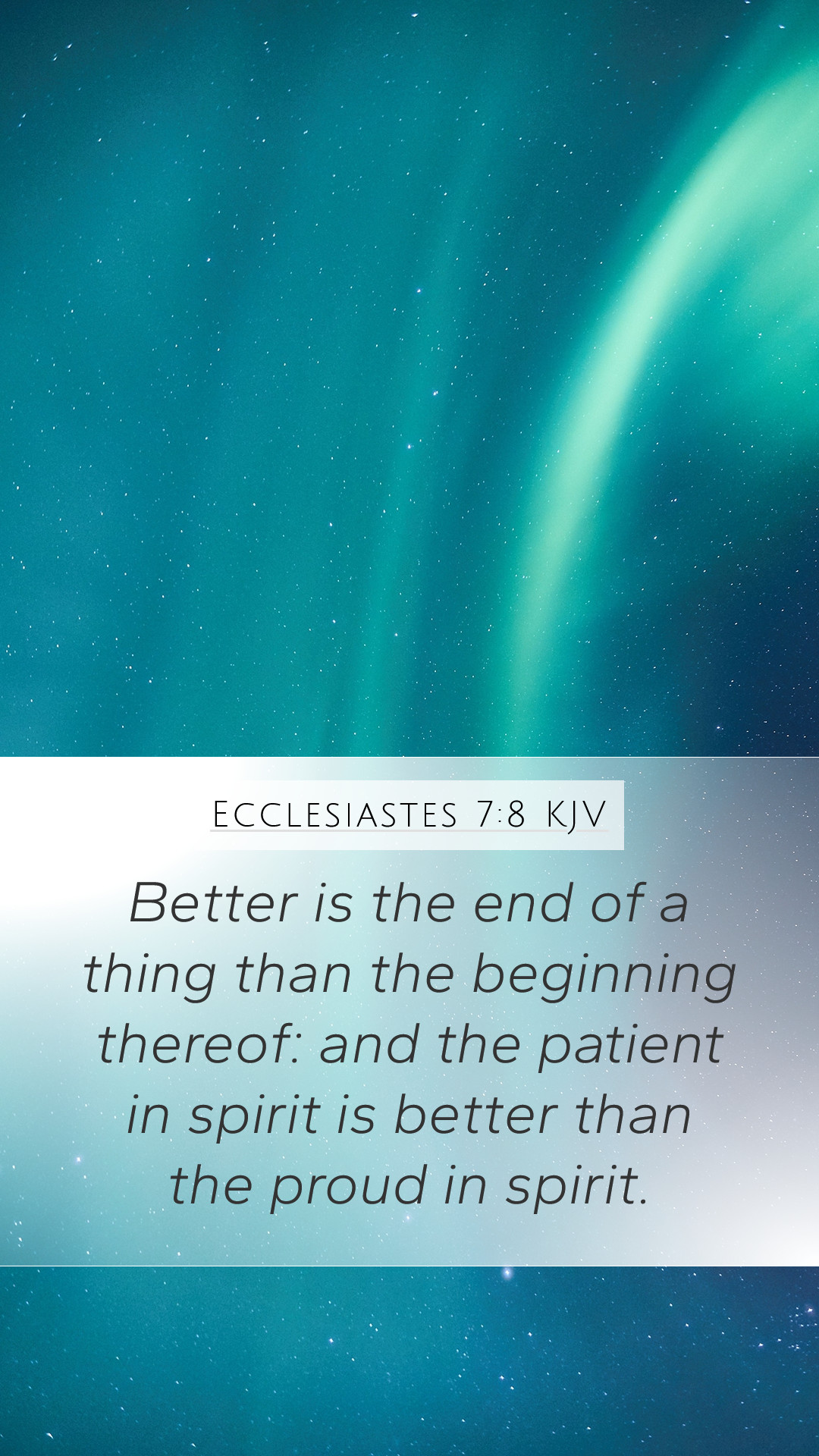Understanding Ecclesiastes 7:8
Ecclesiastes 7:8 states, "Better is the end of a thing than the beginning thereof: and the patient in spirit is better than the proud in spirit." This verse invites a deep exploration into the concepts of patience, the value of endings versus beginnings, and the nature of humility compared to pride.
Bible Verse Meanings
This verse captures profound wisdom about life and its inevitable journeys. Here is a synthesis of insights based on public domain commentaries by Matthew Henry, Albert Barnes, and Adam Clarke.
1. The Value of Endings Over Beginnings
Matthew Henry's Commentary: Henry emphasizes that while beginnings can be exciting and full of promise, it's important to recognize that the conclusion of any endeavor can reveal its true value and purpose. The journey of a project may have its ups and downs, but what ultimately counts is its final outcome.
Albert Barnes’ Notes on the Bible: Barnes elaborates that this reflects a broader truth in life; the fulfillment and completion of a task bear more significance than the initial steps. This perspective encourages believers to maintain a long-term view rather than getting lost in the initial enthusiasm of new ventures.
Adam Clarke’s Commentary: Clarke points out that the trials faced in the process often shape character and determine the worth of the effort. He suggests that wisdom is found in understanding the unfolding of events and appreciating the outcomes that life presents.
2. Patience in Spirit
Matthew Henry’s Insight: Henry notes that patience is a virtue that allows individuals to endure challenges and maintain their integrity throughout life's trials. It implies a deeper trust in God's timing and plan.
Albert Barnes’ Perspective: Barnes supports this view by stating that a patient person possesses an inner strength and stability that surpasses the fleeting triumphs of pride. Such humility is critical in spiritually discerning the victories God grants.
Adam Clarke’s Understanding: Clarke contrasts pride with humility, suggesting that the patient spirit is aligned with God’s character, whereas pride leads to discontent and conflict. He underscores the necessity of recognizing one's limitations and relying on divine support.
3. Application of the Verse to Daily Life
This verse encourages readers to rethink how they approach projects, relationships, and life experiences. Instead of seeking immediate gratification, believers are invited to cultivate patience and attentiveness to the outcome of their endeavors.
By fostering a humble attitude and reflecting on the journey rather than being consumed by the beginning, individuals can find peace amidst trials and ultimately transformational growth.
Bible Verse Explanations and Commentary
The complex emotional landscape of humanity is addressed in Ecclesiastes, emphasizing that our responses to failures and successes shape our spiritual growth. This specific verse serves as a reminder that spiritual maturity often manifests not in haste but in the careful diligence of patience.
Related Bible Cross References
- Proverbs 16:18: "Pride goeth before destruction, and an haughty spirit before a fall."
- James 1:4: "But let patience have her perfect work, that ye may be perfect and entire, wanting nothing."
- Romans 12:12: "Rejoicing in hope; patient in tribulation; continuing instant in prayer."
Conclusion
Ecclesiastes 7:8 encapsulates vital life lessons about the importance of patience and the value of outcomes over beginnings. It serves as a guide for those seeking to deepen their Bible study insights and apply biblical principles to their everyday lives.
As readers engage with this verse, they can reflect on their personal journeys, recognize the significance of both beginnings and endings, and adopt a patient, humble spirit in alignment with God's design.


